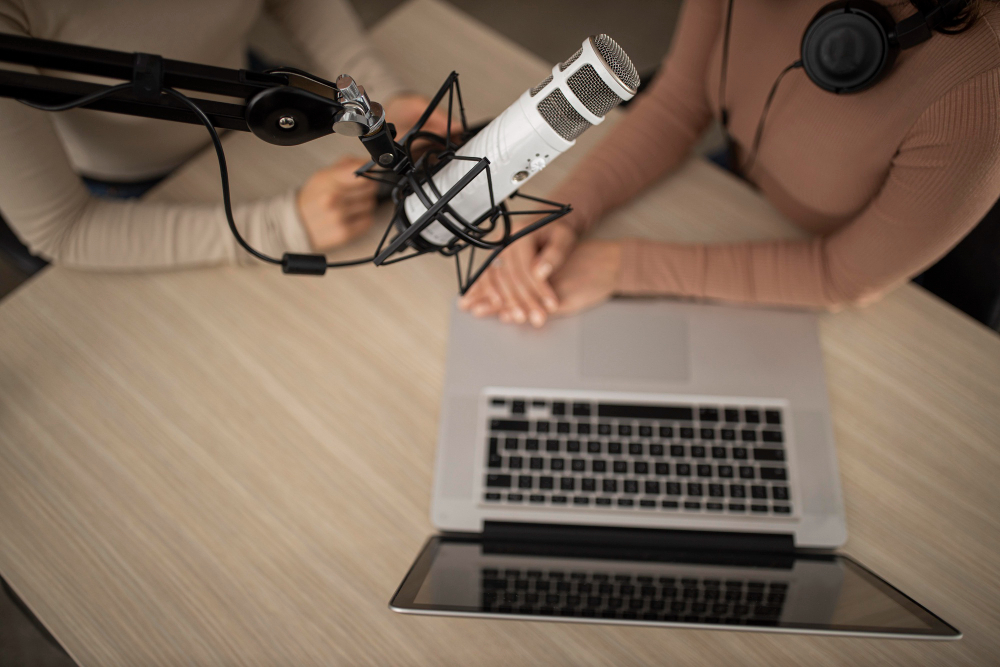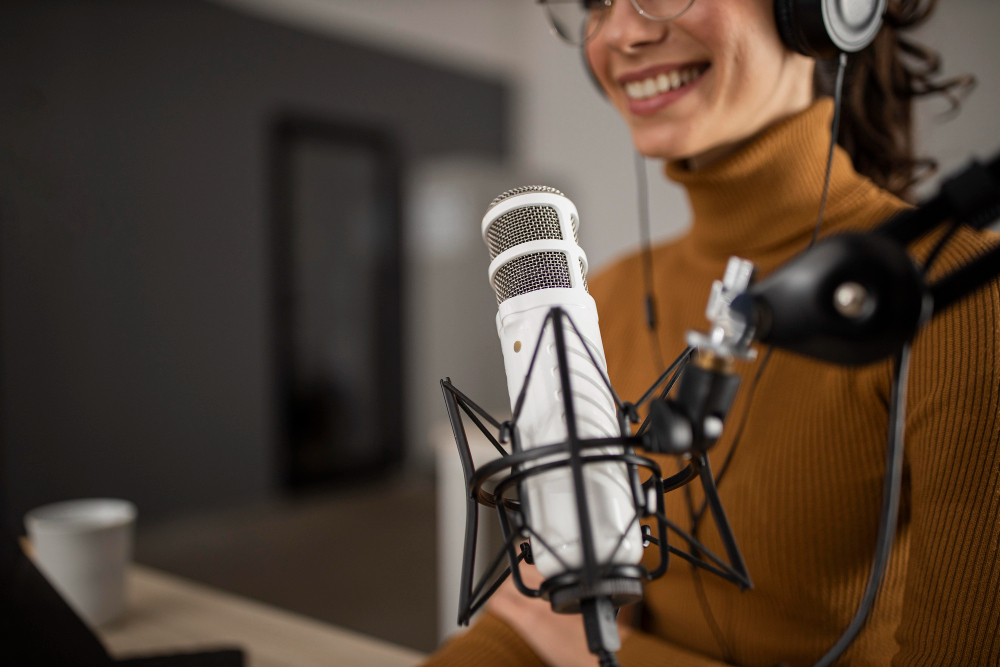Recent Posts
-
Black Friday email campaign
Nov 12 2022 -
Re-engage old list
Oct 27 2022 -
Secret email
Jun 18 2022 -
Email Broadcast
Jun 18 2022
Why NOW Is the Best Time to Start a Podcast

If you already have a successful, popular podcast, then you already know the power of podcasting to create an audience, to build credibility, to make connections with the movers and shakers in your niche, and to sell a lot of products.
Think about this: When you have a podcast, you are in your target market’s ears for 20 to 60 minutes. This is intimate, one-on-one time with no interruptions or competition for their attention. You can create personal (PERSONAL!) relationships with your audience in a way that the written word can never do.
If you want to…
- reach an audience
- sell products or services
- make crucial networking connections
- build a business
… and you don’t already have a podcast, I’d like to suggest that right now is the ideal time to start one.
It’s like that saying, ‘The best time to plant a tree is 20 years ago, and the second best time is right now.’
Maybe the best time to start a podcast was a year ago, but today is nearly as good because unlike almost any other medium, there is still tons of room for you in podcasting.
Five years from now? You’ll either have hundreds of episodes in your pocket and an audience of several hundred thousand (millions maybe?) or you’ll be kicking yourself HARD because you didn’t start a podcast in 2021.
Have you noticed how popular podcasting is becoming? If you had doubts before, surely by now you realize that podcasting is here to stay.
- As of May 2021 there are over 2 million podcasts and over 48 million episodes.
- 37% of the US population listens to podcasts every month.
- Podcast listeners listen to an average of 7 different shows per week
- 93% listen to all or most of each episode
Maybe you’re waiting to start the podcast until you ‘feel ready’ – whatever that means. But here’s the secret every podcaster knows: Almost no one who ever started a podcast was truly “ready”.

In fact, you have the same level of experience as almost every other new podcaster out there. That’s because you know how to TALK, and if you can talk, you can do a podcast.
A few short years from now everyone and their dog will have their own podcast.
But if you start the podcast NOW, your competition will be about 2-5% of what it will be in a few years.
That means it will be 20 to 50 times EASIER to build an audience now than it will be later.
How do you get started?
Maybe you should do a bunch of research, buy some start a podcast- how-to courses, and take the next year to ‘figure it all out’.
Yeah. Because that always works, doesn’t it?
If you take that route then a year from now you will be exactly where you are today – no podcast.
I’d like to suggest a different method, one in which you simply jump in and get started.
No muss, no fuss. You just do it.
It doesn’t matter if NO ONE hears your first few broadcasts. Those are for practice anyway. But the point is to get started NOW, to figure out what you’re doing, and a month from now you can have a legitimate podcast with a real audience.
Your first few podcasts can be for practice while you learn.
And learn you will.
A month from now you can have podcasting experience under your belt as well as a growing audience.
Stop thinking about how to podcast and just start doing it.
Need more motivation?
Check out this list of podcasting facts from PodcastHosting.org:
- 75% of the US population is familiar with the term “podcasting”
- 50% of all US homes are podcast fans
- 55% (155 million) of the US population has listened to a podcast
- 37% (104 million) listen to podcasts at least every month
- 24% (68 million) listen to podcasts weekly
- 16 million people in the US are “avid podcast fans”
- 51% of podcast listeners are male, 49% female
- Age of listeners:
- 12-34: 48%
- 35-54: 32%
- 55+: 20%
- 41% of monthly podcast listeners have a household income over $75K (vs 29% for US population)
- 25% of US podcast listeners have a 4-year college degree (vs 19% of US population)
- 51% employed full-time (vs 44% of US population)
Do you sell anything in your business?
Yeah, stupid question 😊
Check out these advertising stats:
- 81% of podcast listeners pay attention to podcast ads
- 63% say they sometimes or always ignore TV commercials
- 66% sometimes or always ignore digital ads
- 61% sometimes or always ignore billboards
- 59% sometimes or always ignore radio commercials
- 60% of podcast listeners have bought something from a podcast ad
- 72% of people who have listened to a podcast for four or more years have made a purchase
- 54% are more likely to consider the brand advertised (only 7% are less likely)
You might think you need expensive equipment to create a podcast, but you can start with just your smartphone and upgrade later. Here’s everything you need to know about podcasting from your smartphone: https://www.rode.com/blog/all/How-To-Record-a-Podcast-on-Your-Phone
You can even use a service to handle all of the podcast details for you so that all you have to do is the actual podcast. Just search for “done for you podcasting” and you’ll find a variety of options.
As long as you can speak, there simply is no excuse anymore for not podcasting, while there are plenty of reasons to start your own podcast today:
- Podcasts capture your audience’s attention. The same person who won’t read a 10-minute blog post will often listen to a 60-minute podcast.
- Podcasts create a personal experience. Listeners hear your voice and get to know you on a deeper level than with text.
- Podcasts help you build and maintain connections. You can feature guest speakers on your podcast who are industry experts. They create your content for you, and you build a networking connection with them.
- Podcasts build your credibility and positioning in your niche. If you want to be known as a leader in your industry, start a podcast and bring on experts. The key is providing valuable content, fresh ideas and making it fun and interesting for listeners.
- Podcasts make money. Real estate agent turned entrepreneur John Lee Dumas earns $46,000 a month from his podcast, Entrepreneur on Fire. He does it charging sponsors to be featured on his podcast as well as promoting products and services.
Are you convinced yet? I know to start a podcast sounds scary. What if you say stupid stuff? What if you can’t think what to say? What if, what if, what if… remember, there’s something called EDITING which allows you to remove anything you don’t like.
See? No more excuses.
One last thing: Here’s a quick list of even MORE reasons for you to start podcast this year and yes, this MONTH:
- You will build relationships and customer loyalty.
- You’ll enjoy the fun of using running jokes and themes with your audience.
- It’s easy – far easier even than you think.
- Listeners can listen whenever they like, even at 3 in the morning.
- Subscribers get episodes downloaded automatically on their devices.
- All you need to get started is a smartphone, internet connection and software. A laptop is good, too, but not required.
- No one can SEE you, so bad hair days, messy offices and pink polka-dotted pajamas don’t mean a thing.
- You can build your audience.
- Improve conversions through trust. I’ve seen podcast regulars buy products based solely on the recommendation of the podcaster, no sales copy needed. A survey of 300,000 podcast listeners found that 63% of them bought something a host recommended on their show.
- Talking is easier than writing. Far easier. SO MUCH easier.
- Your audience can hear your emotions. It’s not easy to make emotional connections in writing, but it is through speech. Listeners know when you’re happy when you’re upset about something when you’re laughing when you’re serious, and so forth, and it helps to build connection. Why did people fall in love with Oprah? Some say it’s because she allowed herself to become deeply emotional on air, creating a bond with the audience that lasts to this day.
- If you want authority in your niche, you need to either create videos that feature yourself, write best-selling books or do podcasting. If you can do two of those, that’s optional but even better.
- Sell advertising. Take on sponsors. Promote your own products. Do JV’s with your guests. There are tons of opportunities to make money with a podcast.
How to Grow Your Podcast Audience Super Fast

From what I can see, right now there is no faster way to build an audience online than through podcasting.
The demand for podcasts is growing at an unprecedented rate. More than half of people are listening to podcasts on a regular basis. And podcasting creates loyalty and trust with your audience like almost nothing else out there.
Podcast audiences are more engaged and loyal than radio listeners or blog readers. Something like 88-90% of podcast listeners listen to the entire show, including advertisements.
Podcasts are done in episodes, sort of like a television series. When you end one show, you can tease your audience with what’s coming on the next episode (think cliffhanger or bullet points) to ensure they’ll be back.
And get this… 79% of podcast listeners tune in to a new episode as soon as its released!
Think about that last article you slaved over to get every word just right. Now imagine speaking that article, not worrying about getting every word right, letting your personality shine and oh yes, promoting a product, too.
Yes, you really can do this.
But if you’re new to podcasting, how do you grow your audience? In ways similar to how you drive traffic to a website, you can also grow your audience through podcasting SEO.
WAIT!
Does the term SEO create a bit of panic for you? If you’ve never done any SEO before, then it’s perfectly understandable to think SEO might be something other marketers and do but not you. Guess again, because Podcasting SEO is easy enough that almost anyone can use it to bring in listeners, grow your list and maybe even make your podcast go viral. After all, stranger things have happened. 😉
How can you use podcasting SEO to build your audience?
Step 1: Know and Use Your Keywords
You might think that Google has a hard time finding and indexing podcasts, but your text content will go a long way towards helping Google find you and possibly even place one of your podcast episodes on the first page of Google.
Since 2019, Google has been placing links to podcasts in the search results, much like you see Google place YouTube videos there.
Your top two keywords are going to be:
- Your brand/podcast name
- “[your niche] Podcast” Examples: Online Marketing Podcast or Parenting Podcast
Here’s the trick: Host every episode of your podcast on a dedicated page on your website along with the keywords that fit that episode. And always, always include the word “podcast” in your keyword phrases. “How to make money from home” is never going to rank on Google when someone is searching for a podcast, but “How to make money from home podcast” can possibly get you ranked.
Step 2: Optimize Those Episode Pages
You already know you’ll be placing one podcast on a page and using your appropriate keywords on each of those pages. Those keywords are:
- Your podcast brand name
- Your general podcast topic combined with the word ‘podcast’
- The topic-specific to this particular episode
For example, you might have “Minnesota Tycoon” as your brand name, your general topic is business and marketing so it’s the “Minnesota Tycoon Business and Marketing Podcast” and this particular episode is on “Americans Doing Businesses in Canada.”
All of that makes it possible to get your podcast episode featured near the topic of the search page. But let’s go one step further and see if we can also target a keyword to get it ranked in the classic blue links.
In this case, we’re targeting “Americans Doing Business in Canada”. You have options here:
- You can write 300 words or more of unique content about your topic on that page
- You can add a text summary of the podcast itself
- You can create a blog post summary that covers all of the key points in the podcast
You can do any combination of these three items.
Personally, I like to have a short text summary followed by a longer post that covers the key points. This way if people don’t want to listen to the podcast, they can still get the information. However, there is a healthy percentage of people who will read the text summary and then go ahead and listen to the podcast anyway because you’ve hooked them with the summary.
Step 3: Consistent Titles and Catchy Meta Descriptions
The title of your podcast episode is going to be the same title found on the page hosting the episode. In fact, you want to be consistent across every platform that has your episode, whether it’s Spotify, YouTube Google Podcasts and so forth.
For your meta description, your target keyword is the first phrase in your title, and you might want to include the episode number, too. For example, “Americans Doing Business in Canada with The Minnesota Tycoon (Ep 21)”
Next you tell what your podcast is about. Make it honest, accurate, exciting and enticing. That’s a tall order, but you’re trying to get people to click on your link and you only get one shot to make this happen.
Step 4: Keep Google Happy
Google has been transcribing podcast episodes for two years now to improve its search results. This means Google has a very good idea of whether or not you are providing quality content.
You can help Google to decide your podcast is worth sharing with the world by having a clear structure to your podcasts. Rather than rambling or hitting whatever topics come to mind, make an outline of what you’ll talk about or what you’ll be asking your guest so that you can stay on track.
And use relevant keywords throughout the podcast, but use then naturally without keyword stuffing.
Step 5: Sign Up with Google Podcasts Manager
Google Search pulls data from Google Podcasts when showing podcast listings in the search engine results. Google Podcasts is a podcasting directory, meaning that podcast listening apps use Google Podcasts to find podcasts and enable playback. Google Podcasts does not store your RSS feed or audio files, but instead points to the RSS feed and audio files that you have posted elsewhere.
Google Podcasts has over 50 million regular users. Even a teeny tiny percentage of those users coming to your podcast could mean a tremendous boost in your audience size.
To get your content listed in the app, go to https://podcastsmanager.google.com/, click ‘start now’, type in your podcast RSS feed URL and follow the verification steps. Once you’ve done this, Google will index your feed, enabling users to find you on Google Home, Android Auto, Google Search, Google Assistant and Google Podcasts.
Step 6: Expand Your Reach
Sign up with Podfollow at https://podfollow.com/ to enable listeners to hear your podcasts on any platform they choose. Podfollow will also give you insights into where your traffic is coming from, so you’ll know what’s working.
Apple Podcasts and Spotify are two huge players where millions of people can find your podcasts. And there are plenty of other platforms to consider, too.
If you’re creating video podcasts – essentially recording yourself and your guest with video – then you’ll want to place your video podcasts on YouTube. You can even use a service like Patreon to paywall certain episodes. They also offer tiered plans, enabling you to have content for free members, paid members and perhaps an inner circle of movers and shakers who pay for the privilege.
Step 7: Create an Ever-Growing Network of Internal Links
Every time you place a new podcast/page on your website, find the pages already on your site that are related to the new page. Then link from the new page to these other pages, as well as linking from these other pages to your new page.
In addition, link each podcast page to the previous and the next episodes. This not only builds internal links, it also adds some navigational value for users.
Step 8: Transcribe Those Babies
Google’s transcription can have trouble with accents, people talking over each other and so forth.
And some of your users will want a text copy they can read, save, browse and so forth.
So go ahead and have every one of your episodes transcribed. You’ll be giving the search engines a crawlable copy without errors, increasing the chances of getting a good search engine ranking.
Plus, you may find you want to repurpose some of your content into articles, social media posts, books and so forth. With transcriptions, this will be easy to do.
Step 9: Earn Your Backlinks

Podcasts work well for link building, especially if you have guests on your show. And once you’ve built something of a reputation, it will be easy to get more guests and better known guests to join you for an episode.
Backlinks are just as important for podcast SEO as any other strategy, and fortunately it’s not that difficult get backlinks, either.
Start with a podcast homepage, which might be a subdomain or subdirectory. This will be the domain of your podcast strategy, with each podcast having its only page on this domain. You’ll get some backlinks to your podcast homepage and others to each individual podcast.
To earn backlinks, do any and all of the following:
Be Newsworthy – cover the latest developments or new in your niche
Be Controversial – trying to appeal to everyone won’t win you backlinks, but taking a stand will
Be Unique – offer thoughts, insights and ideas found nowhere else
Bring on Guests – guests will increase your authority and win you backlinks from the guests themselves as well as their fans
Appear as a Guest – go on other podcasts as a guest and you’ll usually get a backlink to your own podcast domain
Promote Your Podcast – ask others to review your podcast or ask for their opinion on a subject you covered. Essentially, find ways to tell others in your niche about your podcast episodes without being obnoxious or pushy about it.
Create a Rivalry – team up with another podcast to create back-and-forth perspectives. A friendly rivalry can bring an explosion of new listeners via social media.
Reference Content Producers – anytime you get the chance, reference other authorities in your niche within your podcasts. Quote them, refer to their research, talk about something they did… the more you reach out to others, the more others will reach out to you and give you backlinks.
And when you reference other content producers in your podcast, be sure to include this in any repurposed content and social media posts for maximum effect. This way they’ll see you’ve referenced them and more often than not they’ll want to see what you said and link back to you.
Step 10: Repurpose Your Content
You can create more internal links when you repurpose your content, you can grab people who prefer to read, your content goes further, you can optimize text content for SEO… frankly there are a ton of reasons to repurpose and reuse your content. You can even create list-building lead magnets and books for your content if you like!
You might want to consider recording videos for your podcasts so that you can post on YouTube and social media. Video can be cut into clips, highlights, and short, engaging posts for social media.
You can also repurpose your episodes into blog posts, guides, content series, and so forth.
Think short and long – you’ll be pulling the best bits out of your podcasts to entice people to listen or watch your podcasts. And you’ll be compiling podcast content into longer forms, such as comprehensive posts, books and even reports.
Do you remember when the internet started becoming popular? Some people said it was just a fad.
Do you remember back when video was just catching on? Some people said that was just a fad, too.
Now we’ve got folks saying that start a podcast is a fad. But 5 years from now, there will be two groups of marketers – those who started their own podcast in 2021, and those who wish they had.
Which camp will you be in?
